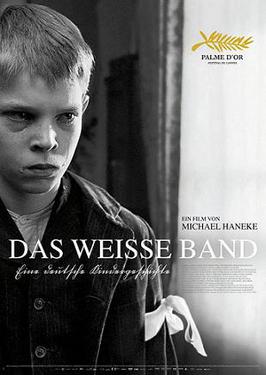
Michael Haneke is probably one of the most visceral and hard hitting film makers, in the world cinema scene, at the minute along with Gasper Noe and Lars Von Trier. However unlike his two counterparts he often sets his films in more realistic environments often documenting the problems and failures within modern society. Suffice to say, they never make for causal viewing. Already winning one of the most prestigious awards of the year the Palme D'Or at Cannes, The White Ribbon is not surprisingly any different.
The story centres around a small village in Germany just before World War I focusing on the local children's choir directed by the village schoolmaster, and their families: the Baron, the superintendent, pastor, doctor, midwife, peasants. From the opening scene strange incidents start to occur such as acts of vandalism and violence, which gradually assume the character of a ritual punishment.
One of the most immediate reactions anyone could have is the truly stunning cinematography. Very few films I have seen this year have made the most of the immense size of a cinema screen as The White Ribbon. Haneke smartly decides to present the story in black and white possibly reflecting the film's narrative of witnessing a cruel twisted world through mainly the eyes of children.
One of the most surprising aspects of the film for me personally was the story itself, thinking it might of been another World War I/II film from the German perspective, it is anything but. In essence it's a bit of a mystery, as the story progresses, you find certain characters do not appear to be all that they seem and the identity of the person who commits these acts keeps you guessing until the very end.
Where the film truly shines however is in the more intimate and innocent moments, reflecting the true beauty of childhood itself. One of the stand out scenes being where the youngest son of the pastor gave his father a bird to replace the one he had lost through a 'prior incident' because the boy could see how the loss of the bird made him very sad. Those aren't the moments this film will be remembered for but will be the scenes that truly add to how wonderful an experience The White Ribbon is.
Though there is no musical score present, it never needed one as the quality of the acting and screenplay was simply glorious. It would be unfair to single out any particular actor in this story as the entire cast complimented each other amazingly, but perhaps the honourable mentions would have to go to young Eddy Grahl for his performance as the mentally disabled child Karli as well as Christian Friedel as the teacher - his name is never actually given, however in this strangely diverse array of characters and personalities, he turns out to be probably the most innocent and incorruptible person in the entire village.
Final Thoughts
Catered more to the needs of die hard world cinema fans than a causal movie goer looking for a couple of hours to kill. Though it may at first appear to be slow moving, if you stick with the beautifully realised dialogue and immerse yourself in the glorious cinematography your patience will be duly rewarded. The White Ribbon is an example of cinema at its most beautiful yet most basic, bringing emphasis back to the actors and their performances instead of being bogged down by useless shock tactics or over-saturated special effects. As the decade draws to a close you can't help but notice how rare a thing that has now become.
9/10
See this if you liked...
Funny Games, The Piano Teacher, Caché (Hidden)
The White Ribbon is currently showing at the Queen's Film Theatre for until the 4th December. If you're a fan of world cinema this is a must.



No comments:
Post a Comment